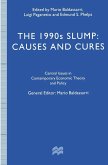The entire world was taken by surprise when 1990 brought an end to Soviet communism in Europe and thus a genuine end to World War II. The fact that these developments surprised not only the leaders and the people of the countries concerned, but also scholars is an extraordinary challenge to the students of Soviet-type economics. In the academic world, where predictive force is one of the key indicators of a successful theory, this weak performance calls into question the validity of earlier findings and interpretations. Something was wrong in the general framework. Socialist Investment Cycles offers an explanation of this failure.
Socialist Investment Cycles is the first monograph in English on investment fluctuations in planned economies, a chapter in history. While providing a broad overview of the literature on socialist investment cycles, as well as a quantitative description of the actual processes, the author puts forth a new framework for understanding investment fluctuations. In this framework socialist planners were able to adjust the volume of investments without risking the fulfillment of politically more sensitive target variables.
Socialist Investment Cycles encompasses all thirty-five countries which were ruled by communism and is the first study to penetrate deeply into the data problem, country by country, and series by series. Socialist Investment Cycles has been written after the collapse of Soviet-type communism in Eastern Europe, the USSR, and the countries of Asia and Africa. It thus offers a retrospective view on both the theory and practice of socialist economies.
Socialist Investment Cycles is the first monograph in English on investment fluctuations in planned economies, a chapter in history. While providing a broad overview of the literature on socialist investment cycles, as well as a quantitative description of the actual processes, the author puts forth a new framework for understanding investment fluctuations. In this framework socialist planners were able to adjust the volume of investments without risking the fulfillment of politically more sensitive target variables.
Socialist Investment Cycles encompasses all thirty-five countries which were ruled by communism and is the first study to penetrate deeply into the data problem, country by country, and series by series. Socialist Investment Cycles has been written after the collapse of Soviet-type communism in Eastern Europe, the USSR, and the countries of Asia and Africa. It thus offers a retrospective view on both the theory and practice of socialist economies.
`The methodological approach presented in this book is clear and interesting and the book deserves to be recommended to economists and students.' Economics of Planning, 27, 1994
`The methodological approach presented in this book is clear and interesting and the book deserves to be recommended to economists and students.'
Economics of Planning, 27, 1994
Economics of Planning, 27, 1994









